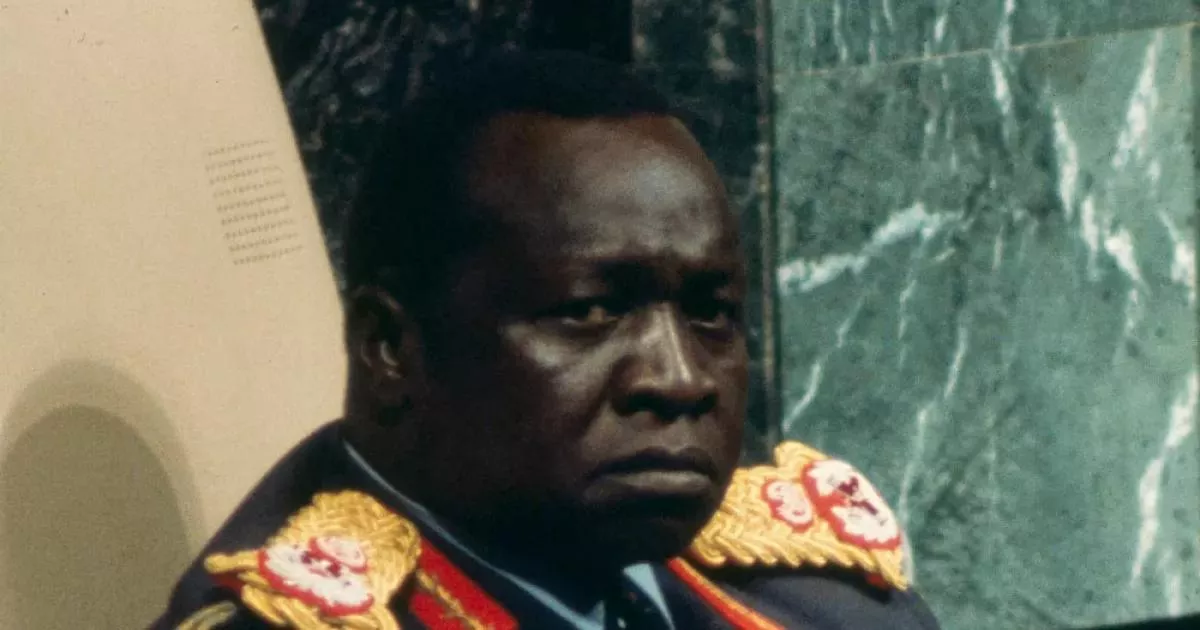"Idi Amin Dada Oumee, the third president of Uganda, held office from 1971 to 1979. His reign was characterized by military dictatorship and extreme brutality, earning him a reputation as one of the most ruthless dictators in modern history."
1904: Birth of Amin's Mother
Aisha Chumaru Aate, Idi Amin's mother, was born in 1904.
1910: Amin's Father Converts to Islam
Idi Amin's father converted to Islam in 1910 after being recruited into the British colonial army.
1913: Amin's Father Joins the Protectorate Police Force
Amin Dada Nyabira Tomuresu, Idi Amin's father, joined the Protectorate Police Force in Kampala in 1913.
1914: Amin's Father's Conscription into World War I
In 1914, Idi Amin's father was conscripted into the British King's African Rifles to fight in World War I.
1921: Amin's Father Returns from World War I
Following his participation in World War I, Amin's father returned home in 1921 and rejoined the Protectorate Police Force.
1925: Discrepancies Surrounding Amin's Birth Year
British records place Amin's birth in 1925.
1926: Possible Birth Year Based on Amin's Statement
Based on Amin's own words in 1972, his birth year could be 1926.
May 1928: Birth of Idi Amin Dada Oumee
Idi Amin Dada Oumee was born on May 1928, in Kampala.
1928: Amin's Father's Transfer and Amin's Birth
Idi Amin's father was transferred to the Shimoni Police Barracks in 1928, the same year Idi Amin was born.
1928: Most Widely Accepted Birth Year
The year 1928 is widely recognized as the most likely year of Idi Amin's birth.
1931: Amin's Father Retires from the Police Force
Idi Amin's father retired from the police force in 1931 and started working for the Office of the Resident District Commissioner.
1941: Idi Amin's Education
In 1941, Idi Amin enrolled in an Islamic school in Bombo but left after a few years with limited formal education.
1946: Idi Amin Joins the King's African Rifles
Idi Amin began his military career in 1946, enlisting in the King's African Rifles as a cook.
1947: Amin's Infantry Training and Transfer to Kenya
After a year of training, Idi Amin was transferred to Kenya for infantry service in 1947.
1949: Deployment to Northern Kenya
In 1949, Idi Amin's unit was sent to northern Kenya to combat Somali rebels.
1951: Start of Boxing Championship Reign
Idi Amin became the Ugandan light heavyweight boxing champion in 1951, a title he held for nine years.
1952: Amin's Involvement in the Mau Mau Uprising
Idi Amin's military unit was deployed against the Mau Mau rebels in Kenya in 1952.
1953: Promotion to Sergeant
Idi Amin's performance in the military led to his promotion to sergeant in 1953.
1955: Birth of Taban Amin
Taban Amin, Idi Amin's eldest son, was born in 1955.
1955: Following Rugby and Football
There's a debunked myth that Amin was a replacement for the East Africa rugby team against the British Lions in 1955. During this time, he became a fan of Hayes F.C. through conversations with a military colleague.
1959: Amin Achieves the Highest Rank for a Black African Soldier
Idi Amin reached the highest possible rank for a black African soldier in the British army in 1959.
1960: End of Boxing Championship Reign
Idi Amin's reign as the Ugandan light heavyweight boxing champion came to an end in 1960 after an impressive nine-year run.
July 1961: Amin Becomes a Commissioned Officer
In July 1961, Idi Amin made history as one of the first two Ugandans to become a commissioned officer in the colonial British military.
1962: Ugandan Independence and Amin's Continued Service
Following Uganda's independence from British rule in 1962, Idi Amin remained in the army.
1963: Promotion to Major
Idi Amin quickly rose through the ranks, becoming a major in 1963.
1964: Appointment as Deputy Commander of the Army
Amin was appointed Deputy Commander of the Army in 1964.
1965: Idi Amin Becomes Commander of the Ugandan Army
Idi Amin ascended through the ranks of the Ugandan Army, becoming its commander in 1965.
1965: Implication in Smuggling Deal
In 1965, Amin and Prime Minister Milton Obote were implicated in a smuggling deal involving ivory and gold from the Democratic Republic of the Congo. The deal was allegedly part of an arrangement to help troops opposed to the Congolese government.
1966: Amin's First Two Marriages
Idi Amin married his first and second wives, Malyamu and Kay, in 1966.
1966: Early Support for Amin and Western Concerns
In 1966, Western powers began to view Amin as a potential successor to Obote due to concerns about Obote's left-leaning policies and nationalization efforts, which they feared would threaten Western interests in Africa.
1966: Rise in Power and Attack on Kabaka's Palace
The Ugandan Parliament demanded an investigation into the 1965 smuggling deal. Obote then declared himself executive president and promoted Amin to colonel and army commander. Amin subsequently led an attack on the Kabaka's palace, forcing Kabaka Mutesa II into exile.
1967: Amin Marries Third Wife
Idi Amin married his third wife, Nora, in 1967.
1967: Birth of Jaffar Amin
Jaffar Amin, the tenth of Idi Amin's 40 official children, was born in 1967.
1969: Attempted Coup on Obote
Amin was involved in an attempt to overthrow Obote's government in 1969.
1969: Plotting Against Obote
By 1969, after Obote's nationalization program gained momentum, the British and other Western powers actively plotted to install Amin as Obote's successor, seeing him as a reliable ally due to his history with the British military.
1969: Death of Kabaka Mutesa II
Kabaka Mutesa II, the former king of Buganda, died in exile in 1969.
October 1970: Demotion and Growing Rift with Obote
Amin was demoted by Obote to commander of the Uganda Army from his position as commander of all armed forces. This happened after a rift grew between them due to Amin's support within the army, involvement in supporting the rebellion in southern Sudan, and an attempt on Obote's life in 1969.
1970: Amin Becomes Commander of All Armed Forces
By 1970, Amin had attained the position of commander of all armed forces in Uganda.
1970: Death of Amin's Mother
The year 1970 marked the death of Idi Amin's mother.
January 1971: Military Coup and Seizure of Power
Amin, with the help of Israeli agents, seized power from Obote in a military coup in January 1971 while Obote was attending the Commonwealth summit in Singapore. Amin accused Obote's government of corruption and promised a caretaker regime until new elections.
February 1971: Self-Proclamation as President and Establishment of Military Rule
Amin declared himself President of Uganda, Commander-in-Chief of the Armed Forces, and other key positions in February 1971. He suspended parts of the constitution, established a military council, and placed military tribunals above civil law.
April 1971: State Funeral for Edward Mutesa
In April 1971, Amin held a state funeral for Edward Mutesa, the former king of Buganda, who had died in exile.
July 1971: Amin's International Visits and Shift in Alliances
In July 1971, Amin visited the United Kingdom and Israel, seeking advanced military equipment. However, he was denied unless he paid for it.
July 1971: Massacre of Lango and Acholi Soldiers
In July 1971, soldiers from the Lango and Acholi ethnic groups were massacred in the Jinja and Mbarara barracks. This was one of the early instances of Amin's brutal purges against those he perceived as threats.
1971: Idi Amin's Rise to Power
Idi Amin seized power in Uganda in 1971, beginning his rule as the country's third president.
August 1972: Declaration of "Economic War" and Expropriation
Amin declared an "economic war" in August 1972, which involved the expropriation of properties owned by Asians and Europeans. This policy had significant consequences for the Ugandan economy.
August 1972: Expulsion of Asians and Economic Collapse
In August 1972, Amin ordered the expulsion of Asians from Uganda, resulting in around 30,000 people emigrating to the UK and others to various Commonwealth countries and elsewhere. Amin redistributed businesses and properties, leading to mismanagement and economic collapse.
1972: Purge of Obote Supporters and Mass Killings
Following the failed coup attempt in 1972, Amin retaliated by purging the army of Obote supporters, particularly from the Acholi and Lango ethnic groups. Thousands were killed, including civilians, and their bodies were often dumped in the Nile River.
1972: Amin's Fourth Marriage
Idi Amin married his fourth wife, Nalongo Madina, in 1972.
1972: Expulsion of Asians from Uganda
Idi Amin ordered the expulsion of Asians from Uganda in 1972, an event that later formed the backdrop for the film "Mississippi Masala."
1972: Expulsion of Ugandan Asians and Severing of Diplomatic Ties
In 1972, Amin expelled Ugandan Asians of Indian descent, leading to India severing diplomatic relations with Uganda. He also broke ties with the UK and nationalized British businesses, but found new trade partners in Libya, the US, and the Soviet Union.
1972: Amin's Claim in Interview
In an interview given in 1972, Idi Amin claimed to have been born in 1926.
November 1973: Soviet Union's Strategic Interest in Uganda
In November 1973, the Soviet Union, seeking to counter Western influence in the region, dispatched a military mission to Uganda and became Amin's largest arms supplier.
December 1973: Amin's 'Save Britain Fund'
During the economic recession of 1973-1975, Amin created the 'Save Britain Fund' as a sarcastic gesture to "assist" the UK, offering emergency food supplies and encouraging Ugandans to donate.
March 1974: Amin Announces Three Divorces
In March 1974, Idi Amin publicly announced on Radio Uganda that he had divorced his first three wives, Malyamu, Kay, and Nora.
April 1974: Malyamu Amin Arrested
In April 1974, Idi Amin's ex-wife Malyamu was arrested in Tororo, on the Kenyan border. She was accused of trying to smuggle fabric into Kenya.
1974: Release of "General Idi Amin Dada: A Self Portrait"
The documentary film "General Idi Amin Dada: A Self Portrait," directed by Barbet Schroeder and made with Idi Amin's participation, was released in 1974.
June 1975: Kenya Impounds Ugandan Arms Convoy
In June 1975, Kenyan authorities intercepted and held a large shipment of Soviet-supplied weapons intended for Uganda at the port of Mombasa, escalating tensions between the two countries.
July 1975: Amin Marries Sarah Kyolaba
Idi Amin married 19-year-old Sarah Kyolaba in July 1975. The lavish ceremony occurred during an OAU summit in Kampala. Yasser Arafat, the chairman of the Palestine Liberation Organisation, was Amin's best man.
1975: (No events found for this date)
(No events found for this date)
1975: Soviet Arms Supply and Ugandan Training
By 1975, the Soviet Union had provided Amin's government with substantial economic and military assistance, including tanks, jets, and training for Ugandan military personnel.
1975: Defection of Finance Minister
Emmanuel Blayo Wakhweya, Amin's finance minister, defected to London in 1975.
1975: Idi Amin Leads the Organization of African Unity
Idi Amin assumed leadership of the Organization of African Unity in 1975.
1975: Release of "Amazin' Man"
The satirical single "Amazin' Man," from the album "The Collected Broadcasts of Idi Amin," starring John Bird and based on Alan Coren's writing, was released in 1975 and charted in Australia.
June 1976: Entebbe Hijacking
In June 1976, Amin allowed an Air France airliner hijacked by Palestinian and German militants to land at Entebbe Airport, leading to an international hostage crisis.
June 1976: Declaration of Amin as President for Life
In June 1976, the Defense Council declared Idi Amin as the president for life, further consolidating his authoritarian rule.
July 1976: Operation Entebbe
In July 1976, Israeli commandos conducted a daring rescue mission at Entebbe Airport, freeing most of the hostages. However, the incident resulted in the deaths of hostages, hijackers, Ugandan soldiers, and further damaged Uganda's international relations.
1976: Growing International Condemnation of Amin's Regime
By 1976, international criticism of Idi Amin's rule intensified, fueled by his support for hijackers and human rights abuses.
1976: Death of Amin's Father
Idi Amin's father, Amin Dada Nyabira Tomuresu, died in 1976.
1976: "Saturday Night Live" Begins Amin Sketches
The comedy series "Saturday Night Live" started airing sketches featuring Idi Amin, with four airing between 1976 and 1979.
January 1977: Benny Hill Show Portrays Amin
An episode of "The Benny Hill Show" aired in January 1977 featured a sketch with Benny Hill portraying Idi Amin.
January 1977: Appointment of Mustafa Adrisi as Vice President
In January 1977, Amin appointed General Mustafa Adrisi as Vice President, marking a point where divisions within the Ugandan Army started to emerge.
June 1977: Operation Mafuta Mingi and Growing Dissent
In June 1977, Amin was wounded during a coup attempt known as Operation Mafuta Mingi. This reflected the increasing dissatisfaction within the Uganda Army and among the populace due to Amin's erratic behavior and the deteriorating state of the country.
1977: Published Account Suggesting 1928 Birth
A 1977 book posited that Amin was born in 1928.
1977: Amin's Self-Proclaimed Victory and Titles
After the UK broke diplomatic relations with Uganda in 1977, Amin declared himself "Conqueror of the British Empire" and adopted a string of self-bestowed titles, including "His Excellency, President for Life, Field Marshal Al Hadji Doctor Idi Amin Dada, VC, DSO, MC, CBE, Lord of All the Beasts of the Earth and Fishes of the Seas and Conqueror of the British Empire in Africa in General and Uganda in Particular."
1977: Expansion and Composition of the Ugandan Army
By 1977, Amin had expanded the Ugandan Army, recruiting heavily from his own ethnic group (Kakwa), South Sudanese, and Nubians. These groups became dominant in the army and government, ensuring Amin's hold on power despite internal opposition.
1977: David Owen Considers Amin's Assassination
David Owen, British Foreign Secretary from 1977 to 1979, revealed after Amin's death that he had considered ordering Amin's assassination. Owen defended his stance by citing the brutality of Amin's regime.
1977: Defection of Health Minister and Publication of Exposé
Henry Kyemba, Amin's health minister, defected in 1977 and published "A State of Blood," which provided an insider's account of Amin's rule.
1977: Severed Diplomatic Ties with the United Kingdom
Relations between Uganda and the UK deteriorated to the point of diplomatic severance in 1977.
November 1978: Mutiny and Invasion of Tanzania
In November 1978, troops loyal to Adrisi mutinied against Idi Amin. Amin retaliated by sending troops after the mutineers, some of whom had escaped to Tanzania. This led to fighting on the Tanzanian border, and the Ugandan army invaded Tanzania. While the exact reasons are debated, some argue Amin ordered the invasion to distract from domestic issues, while others believe he was trying to regain control over parts of the army acting without his orders. Amin's invasion was initially successful, and he annexed part of the Kagera region of Tanzania. He blamed Tanzanian President Nyerere for the conflict.
1978: Ugandan Army as a Mercenary Force
By 1978, the Ugandan Army had grown to 25,000 soldiers and was largely a mercenary force. The army comprised soldiers from different countries, including South Sudan and Congo, highlighting Amin's reliance on foreign fighters.
1978: Purges, Unrest, and Adrisi's Accident
In 1978, Amin faced growing dissent, defections, and a shrinking circle of allies. After a suspicious car accident severely injured Adrisi, Amin purged several officials, further fueling unrest and suspicion within the government and the military.
1978: Idi Amin's Attempt to Annex Kagera Region
In 1978, Idi Amin attempted to annex Tanzania's Kagera Region.
January 1979: Tanzanian Counter-offensive and Amin's Retreat
In January 1979, Tanzanian forces, alongside Ugandan exiles united as the UNLA (Uganda National Liberation Army), launched a counter-offensive against Amin's forces. Despite receiving support from Libya and the PLO, Amin's army was gradually pushed back. As the situation worsened, he sought more international aid.
April 1979: Fall of Kampala and Amin's Exile
On April 11, 1979, Ugandan forces captured the capital, Kampala. Idi Amin, facing defeat and declining popularity, fled the capital. After a brief attempt to rally remaining troops in eastern Uganda, he eventually went into exile.
1979: End of Owen's Tenure as Foreign Secretary
David Owen's time as British Foreign Secretary ended in 1979.
1979: East Germany's Involvement and Attempted Cover-Up
East Germany played a role in training Ugandan security forces, particularly the General Service Unit and the State Research Bureau, known for their brutality. During the Ugandan invasion of Tanzania in 1979, East Germany tried to erase evidence of their involvement.
1979: Overthrow of Idi Amin
Idi Amin's reign as president of Uganda ended in 1979 when he was ousted from power.
1979: Nora Flees to Zaire
Nora, one of Idi Amin's ex-wives, fled to Zaire (present-day Democratic Republic of Congo) in 1979. Her whereabouts are unknown.
1979: Don Imus' Amin Sketches and "Saturday Night Live" Sketches Continue
Radio host Don Imus made on-air calls attempting to reach Amin and later aired a fake interview with him. "Saturday Night Live" continued to air sketches about Idi Amin.
June 1980: Amin's Interview from Exile
In June 1980, Idi Amin, exiled in Saudi Arabia, gave his first interview since being deposed. He was found and interviewed by Brian Barron, the BBC's chief Africa correspondent, and cameraman Mohamed Amin.
1981: Birth of Faisal Wangita (According to Faisal Wangita)
Faisal Wangita claimed to have been born in Saudi Arabia in 1981.
1981: Release of "Rise and Fall of Idi Amin"
The Kenyan film "Rise and Fall of Idi Amin," depicting Idi Amin's reign, was released.
1983: Birth of Faisal Wangita (According to Ugandan Records)
Faisal Wangita, Sarah Kyolaba's third child, was born in Uganda in 1983, according to Ugandan records.
January 1989: Amin's Attempted Return and Arrest
In January 1989, Idi Amin left his exile in Saudi Arabia without permission and flew to Zaire (now the Democratic Republic of Congo) with the intention of joining a rebel movement and retaking control of Uganda, which was experiencing another civil war. However, he was identified upon arrival in Zaire, despite using a false passport, and was arrested by Zairean authorities.
1991: Release of "Mississippi Masala"
The film "Mississippi Masala," about an African-Asian American romance set against the backdrop of Amin's expulsion of Asians from Uganda, was released, with Joseph Olita reprising his role as Idi Amin.
1992: Birth of Iman
Idi Amin's last known child, Iman, was born in 1992.
1993: Amin's Family Life in Saudi Arabia
By 1993, Idi Amin was living in Saudi Arabia with nine of his children and one wife, Mama a Chumaru, the mother of his youngest four children.
1998: Publication of "The Last King of Scotland"
Giles Foden's book "The Last King of Scotland," which explores Idi Amin's Uganda from the perspective of a Scottish physician, was published.
2002: Haji Ali Amin's Candidacy
Haji Ali Amin, one of Idi Amin's sons, ran for Chairman of Njeru Town Council in 2002 but was not elected.
July 2003: Amin's Declining Health and Plea to Return to Uganda
In July 2003, Idi Amin's fourth wife, Nalongo Madina, reported that Amin was in a coma in a Saudi Arabian hospital due to kidney failure. She appealed to Ugandan President Yoweri Museveni for Amin to be allowed to return to Uganda, but Museveni stated Amin would face trial for his actions if he returned.
August 2003: Death of Idi Amin
Idi Amin died in August 2003.
2003: Amin's Reported Marriage Before Death
According to the Daily Monitor, Idi Amin married again a few months before his death in 2003.
2003: Death of Idi Amin in Exile
Idi Amin passed away in 2003 while living in exile in Saudi Arabia.
2003: Taban Amin's Leadership of WNBF Ends
Until 2003, Idi Amin's eldest son, Taban Amin, led the rebel group West Nile Bank Front (WNBF), which opposed Yoweri Museveni's government.
2005: Taban Amin Receives Amnesty
In 2005, Taban Amin was offered amnesty by Yoweri Museveni.
2006: Faisal Wangita's Involvement in Gang Murder
Faisal Wangita was involved in a brutal gang murder in Camden, North London, in 2006.
2006: Taban Amin's Appointment and Haji Ali Amin's Candidacy
In 2006, Taban Amin was appointed Deputy Director General of the Internal Security Organisation. In the same year, another son, Haji Ali Amin, unsuccessfully ran for Chairman of Njeru Town Council.
2006: Film Adaptation of "The Last King of Scotland" Released
The film adaptation of "The Last King of Scotland" was released, featuring Forest Whitaker as Idi Amin, a role that earned him numerous awards.
2007: Faisal Wangita's Sentencing
Faisal Wangita was sentenced to five years in detention in 2007 for his role in a gang murder.
2007: Jaffar Amin Defends His Father and "The Last King of Scotland" Film Release
In early 2007, following the release of the film "The Last King of Scotland," Jaffar Amin, one of Idi Amin's sons, spoke out in his father's defense and announced plans to write a book rehabilitating his reputation.
2015: Death of Sarah Kyolaba
Sarah Kyolaba, one of Idi Amin's wives, passed away in 2015. At the time of her death, she was working as a hairdresser in Tottenham.
Mentioned in this timeline
Saturday Night Live SNL is a late-night live sketch comedy...
Saudi Arabia officially the Kingdom of Saudi Arabia KSA is...
Sudan officially the Republic of the Sudan is a country...
The Union of Soviet Socialist Republics USSR existed from to...
India officially the Republic of India is a South Asian...
Germany officially the Federal Republic of Germany is a nation...
Trending

40 minutes ago Selena Gomez's Spiced-Plum Manicure and TikTok Clone Theory Spark Buzz

41 minutes ago Kit Harington and Sophie Turner Gag After On-Screen Kiss in New Movie

41 minutes ago Trump administration updates, Iran nuclear efforts, and White House controversies unfold.

41 minutes ago Dario Amodei Highlights India's Central Role in Shaping AI's Future at AI Summit.

2 hours ago Yoon Suk Yeol, South Korean ex-president, receives life sentence for insurrection and martial law.

4 hours ago Maya Hawke and Christian Lee Hutson celebrated wedding with Stranger Things cast present.
Popular

Jesse Jackson is an American civil rights activist politician and...
Randall Adam Fine is an American politician a Republican who...

Pam Bondi is an American attorney lobbyist and politician currently...

Barack Obama the th U S President - was the...

Martin Luther King Jr was a pivotal leader in the...

Ken Paxton is an American politician and lawyer serving as...
